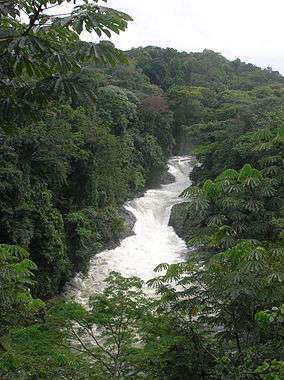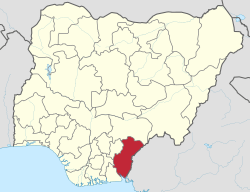Cross River State
| Cross River | ||
|---|---|---|
| State | ||
| État de Cross River | ||
 Kwa Falls, a waterfall along the Kwa River | ||
| ||
| Nickname(s): The People's Paradise | ||
 Location of Cross River State in Nigeria | ||
| Coordinates: 5°45′N 8°30′E / 5.750°N 8.500°ECoordinates: 5°45′N 8°30′E / 5.750°N 8.500°E | ||
| Country |
| |
| Geopolitical Zone | South South | |
| Date created | 27 May 1967 | |
| Capital | Calabar | |
| Government | ||
| • Governor (List) | Benedict Ayade (PDP) | |
| • Deputy Governor | Ivara Esu | |
| • Senators |
Gershom Bassey Rose Okoji Oko John Enoh | |
| Area | ||
| • Total | 20,156 km2 (7,782 sq mi) | |
| Area rank | 19th of 36 | |
| Population (2016) | ||
| • Total | 3,737,517 | |
| • Rank | 28th of 36 | |
| • Density | 190/km2 (480/sq mi) | |
| GDP (PPP) | ||
| • Year | 2007 | |
| • Total | $15.56 billion[1] | |
| • Per capita | $5,150[1] | |
| Time zone | UTC+01 (WAT) | |
| ISO 3166 code | NG-CR | |
Cross River is a state in South South Nigeria,[2]:222 bordering Cameroon to the east. Its capital is Calabar, and its name is derived from the Cross River (Oyono), which passes through the state. French, Boki, Ejagham and Efik are major languages of this state.
Geography
Cross River State derives its name from the Cross River which passes through the state. It is a coastal state located in the Niger Delta region, and occupies 20,156 square kilometers. It shares boundaries with Benue State to the north, Ebonyi and Abia States to the west, to the east by Cameroon Republic and to the south by Akwa-Ibom and the Atlantic Ocean.[3]
History
The South-South State was created on May 27,1967 from the former Eastern Region, Nigeria by the General Yakubu Gowon regime. Its name was changed to Cross River State in the 1976 state creation exercise by the then General Murtala Mohammed regime from South Eastern State.[2]:222 The present day Akwa Ibom State was excised from it in the state creation exercise of September 1987 by the then regime of General Ibrahim Babangida.[4] Its capital is Calabar. Its major towns are Akamkpa, Biase, Calabar South, Ikom, Igede, Obubra, Odukpani, Ogoja, Bekwarra, Ugep, Obudu, Obanliku, Akpabuyo, Ofutop, Iso-bendghe, Danare, Boki, Yala, Bendeghe Ekiem, Etomi, Ukpe and Ukelle.
The state has been previously governed by many governors and administrators including Udoakaha J. Esuene, Paul Omu, Tunde Elegbede, Clement Isong, Donald Etiebet, Daniel Archibong, Ibim Princewill, Ernest Atta, Clement Ebri, Ibrahim Kefas, Gregory Agboneni, Umar Faoruk Ahmed, Christopher Osondu, Donald Duke, Liyel Imoke and Benedict Ayade. The Current Governor is Benedict Ayade, who was sworn into office on the 29th of May, 2015.
Demographics
The State is composed of several ethnic groups, which include the Efik, the Ejagham, Yakurr, Bette, Yala, Igede, Ukelle and the Bekwarra. The Efik language is widely spoken in the southern part of Cross River State, especially in Calabar Municipality, Calabar South and Odukpani. The Ejagham language is the most widely spoken language in Cross River State; from Calabar Municipality, Akamkpa, Ikom, Obubura, Ogoja, Obudu, and Etung local government councils, to the south west province of Cameroon.
The Efik-speaking people live mainly in the Southern senatorial districts of Cross River, or as it is commonly referred to, the Greater Calabar district, which includes Calabar Municipality, Calabar South, Bakassi, Biase, Akpabuyo, Odukpani, and Akamkpa LGAs. There is also the Qua community in Calabar, which speaks Ejagham. The main Ejagham group occupies mostly the Greater Calabar areas of Calabar Municipality, Odukpani, Biase and Akampkpa sections of Cross River State.
There are also the Yakurr/Agoi/Bahumono ethnic groups in Yakurr and Abi LGA, while the Mbembe are predominantly found in Obubra LGA. Further up the core northern part of the state are several sub-dialectical groups, among which are Etung, Olulumo, Ofutop, Nkim/Nkum, Abanajum, Nseke and Boki in both Ikom, Etung and Boki LGAs. Also, the Yala/Yache, Igede, Ukelle, Ekajuk, Mbube, Bette, Bekwarra and Utugwanga people are found in Ogoja, Yala, Obudu and Obanliku LGA's. The Yala are a subgroup of the Idoma nation, part of the Yala LGA's subgroups are the Igede speaking people believed to have migrated from the Oju part of Benue State, who migrated from Ora, in Edo North.
Cross River State epitomises the nation's linguistic and cultural plurality and it is important to note that, in spite of the diversity of dialects, all the indigenous languages in the state have common linguistic roots as Niger–Congo languages. Finally, the State boasts of being the venue of the largest carnival in Africa.
Health Sector Development
Cross River healthcare delivery system is skewed in favour of the urban settlements.
Local Government Areas
Cross River State consists of eighteen (18) Local Government Areas. They are:
Festivals
In line with the objectives of the former Governor of the state Mr. Donald Duke to mix business with pleasure, there are many festivals. These festivals bring in tourists from far and wide into the state to enjoy themselves and also do business in the state. These festivals include The Cross River State Christmas Festival, which promises to be an event that will rival any festival events in Africa, with over 30 days of endless fun, carnival, games, cultural display, art exhibition, pageant and music performance. This year's Christmas event and Carnival promise to be the best.
- The Cross River State Christmas Festival – 1 December to 31 December annually
- The Cross River State Carnival Float – 26th and 27th December yearly
- The Yakurr Leboku Yam festival – 28 August annually
- The Calabar Boat Regata
Another Interesting Festival in cross River state is Anong Bahumono Festival which holds in Anong Village, during which different cultural dances are showcased, including Ikpobin (acclaimed to be the most entertaining dance in the state), Ekoi, Obam, Emukei and Etangala Dances.
- Obanliku New Yam Festival - last Saturday of August Every Year.Also bekwarra yam festiva which is held every 2nd Saturday of September every year.
Tourism
From the soaring plateaus of the mountain tops of Obanliku to the Rain forests of Afi, from the Waterfalls of Agbokim and Kwa to the spiralling ox-bow Calabar River which provides sights and images of the Tinapa Business Resort, Calabar Marina, Calabar Residency Museum and the Calabar Slave Park along its course, there is always a thrilling adventure awaiting the eco-tourist visiting Cross River State.
Other tourist attractions are the Ikom Monoliths (a series of volcanic-stone monoliths of unknown age), the Mary Slessor Tomb, Calabar Drill Monkey Sanctuary, Cross River National Park, Afi Mountain walkway canopy, Kwa falls, Agbokim waterfalls, Tinapa Business Resort and the annual Calabar Carnival that takes place during the Christmas period.
Cross River State can be accessed by air through the Margaret Ekpo International Airport at Calabar. There are daily flights to Calabar from Lagos and Abuja serviced by airlines such as Arik Airlines and Aero Contractors. Aero Contractors also have flights to the Bebi airstrip at Obanliku for trips to the Obanliku Mountain Resort.
Education
Tertiary educational institutions in the State includes University of Calabar and Cross River State University of Technology located in the state capital Calabar, Ibrahim Babangida College of Agriculture located in Obubra Local Government Area, Cross River State College of Education located in Akamkpa Local Government Area, College of Health Technology, Iboko Okpoma, Federal College of Education located in Obudu[5] and Technical College Ugep located in Yakurr Local Government Area.[6]
See also
References
- 1 2 "C-GIDD (Canback Global Income Distribution Database)". Canback Dangel. Retrieved 2008-08-20.
- 1 2 Benjamin Obi Nwabueze (1982). "A Constitutional History of Nigeria". C. Hurst and Co LTD, UK.
- ↑ Andem, A. B; Udofia, U. U; Okorafor, K. A; George, U. U (2013-08-11). "Bioaccumulation of some Heavy Metals and Total Hydrocarbon (THC) in the Tissues of Periwinkle (Tympanotonus Fuscatus Var Radula) in the Intertidal Regions of Qua Iboe River Basin, Ibeno, Akwa Ibom State, Nigeria". Greener Journal of Biological Sciences. 3 (7): 258–264. doi:10.15580/gjbs.2013.7.072913762. ISSN 2276-7762.
- ↑ https://www.nigeriagalleria.com. "Brief History of Cross-River State:: Nigeria Information & Guide". www.nigeriagalleria.com. Retrieved 2018-07-05.
- ↑ https://www.fceobudu.edu.ng/
- ↑ "Institutions". National Board for Technical Education. Retrieved 2010-03-20.
